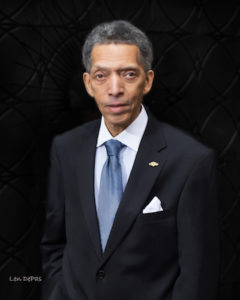
George Carruthers
George R. Carruthers, a Black astrophysicist, was born on this date in 1939.
Carruthers grew up in Chicago and attended the University of Illinois, where he received a B.S. (1961) in aeronautical engineering, an M.S. (1962) in nuclear engineering, and a Ph.D. (1964) in aeronautical and astronomical engineering. After graduation, Dr. Carruthers joined the rocket astronomy group at the Naval Research Laboratory (NRL) in Washington, where his work focused on ultraviolet observations of the Earth's upper atmosphere and astronomical phenomena.
Dr. Carruthers is an astrophysicist of international renown. He was the principal inventor of the first moon-based observatory, the Far Ultraviolet Camera/Spectrograph, a combination of spectrograph and camera, with an electron intensifier—used for the Apollo 16 mission to the moon in 1972.
A physicist and an inventor, Dr. Carruthers has been the principal investigator for several NASA projects. In addition to developing space telescopes, Dr. Carruthers' impressive accomplishments include a rocket experiment that resulted in the first detection of molecular hydrogen in space, developing a rocket instrument to capture an ultraviolet image of Halley's Comet, and capturing an image of a Leonid shower meteor entering the Earth's atmosphere.
After nearly 40 years, Dr. Carruthers, a pioneer in using ultraviolet spectroscopy to study the universe, continues to be at the forefront of astrophysics research.
He was a member of the American Astronomical Society, the American Geophysical Union, AIAA, AAAS, and the National Technical Association. From 1983 to the present, he has been chair of the Editing and Review Committee and editor of the Journal of the National Technical Association.
Dr. Carruthers held the position of Rocket Astronomy Research Physicist from 1964 to 1982. He was head of the Ultraviolet Measurements Branch of the Naval Research Laboratory. An inventor, George Carruthers, was instrumental in the design of lunar surface ultraviolet cameras. Dr. Carruthers's research focused on research in experimental investigations of atomic nitrogen recombination.
He has received many awards, including the Arthur S. Fleming Award (Washington Jaycees), 1971; Exceptional Achievement Scientific Award Medal, NASA, 1972; the Warner Prize of the American Astronomical Society; a National Science Foundation Fellow; and the Honorary Doctor of Engineering, Michigan Technological University.
In 2003, Carruthers was inducted into the National Inventor's Hall of Fame for his work in science and engineering.
American Men and Women of Science, 12th edition
(New York, Bowker), p.909.